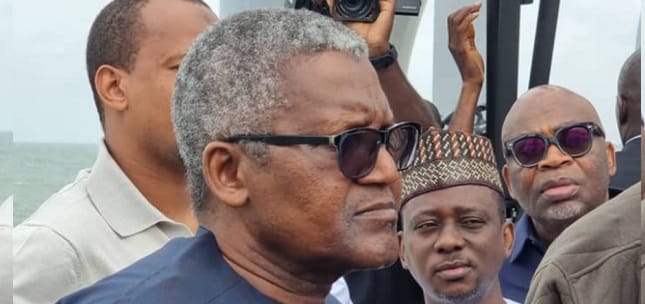Africa’s richest man, Aliko Dangote, reveals that a friend who began investing abroad four years ago has been mocking him due to his recent struggles with the government.
Dangote has faced challenges with the government concerning his refinery project in Lagos. He previously described how a group was obstructing his efforts to import crude and how obtaining products has been problematic, hindering progress. Recently, the Nigerian Midstream and Downstream Petroleum Regulatory Authority (NMDPRA) announced that the government has not yet granted the Dangote refinery a license to start operations.
Farouk Ahmed, CEO of NMDPRA, revealed during a press briefing at the State House on Thursday that the refinery’s current challenges are not due to deliberate sabotage by International Oil Companies.
He clarified that the Dangote refinery is still in the pre-commissioning phase and has not yet been licensed. Ahmed also mentioned concerns about the refinery’s diesel product falling short of international standards, a point Dangote disputed in a recent discussion. During an interview, Dangote recounted how a friend he had urged to support Nigeria is now mocking him.
Dangote recounted that four years ago, a wealthy friend of his started investing abroad. He had urged the friend to reconsider, advocating for investment in Nigeria for the country’s benefit. The friend, citing policy inconsistencies and interest group manipulations, criticized Dangote’s stance and has recently mocked him, claiming he had been right all along.
Dangote emphasized that his investment in the refinery was meant to address a critical national issue and expressed frustration over opposition to his efforts. At 67, he noted he has little personal gain from the project and cannot take it with him, highlighting that his motives are nationalistic.
He mentioned the persistent fuel crisis since the 1970s and suggested that the refinery could be a solution. However, he feels some people are uncomfortable with his involvement and is open to having the NNPC purchase and manage the refinery, ensuring the country benefits from high-quality products and job creation.
The 650,000 barrel-per-day refinery, which began operations last year after a decade of construction, cost $19 billion—more than double the initial estimate. It aims to reduce Africa’s largest oil producer’s dependence on imported fuel and save up to 30% of the foreign exchange spent on imports.


